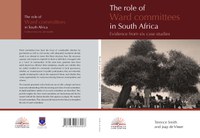The Role of Ward Committees in Enhancing Participatory Local Governance and Development in South Africa: Evidence from Six Ward Committee Case Studies
The mention of ward committees typically solicits quite negative
views. Supporters of these structures claim that they provide an
important channel for citizens to have their voices heard at local
level (especially in a context where there are few existing
alternatives for citizens to be involved in governance at local level).
However, most observers appear to be critical of ward committees,
arguing that most committees in the country are not functioning as
intended and that rather than enhancing the environment of
participatory governance ward committees have actually undermined it by
displacing many other former channels for public participation.
Moreover, ward committees are usually viewed as highly partisan
structures aligned to party political agendas.
[excerpt taken from the
Introduction]

